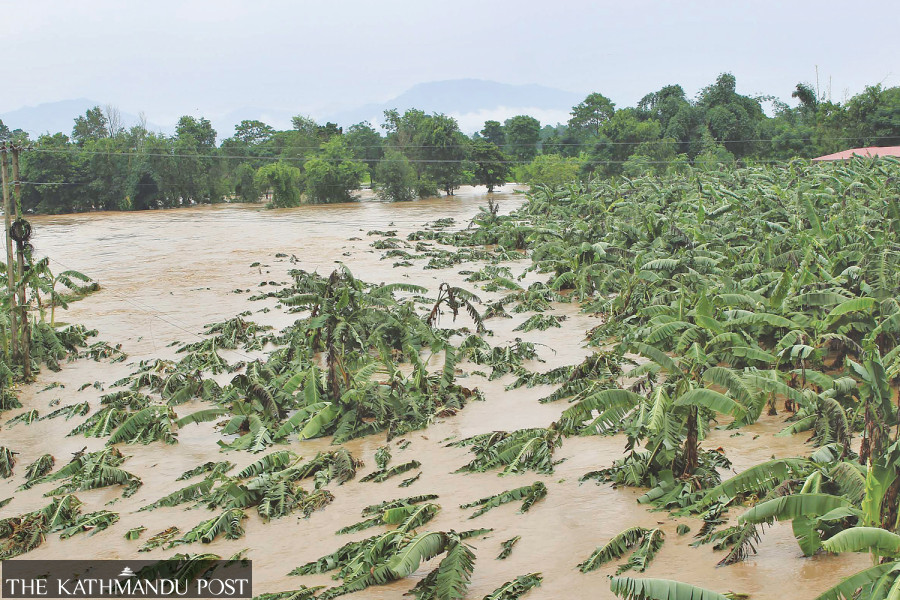Columns
Food security and climate resilience
Inadequate adaptation and mitigation strategies put the nation's food security and livelihoods in jeopardy.
Khim Lal Devkota
Nepal’s Right to Food and Food Sovereignty Act, 2075 (2018), one of 349 Acts, is significant for citizens. It upholds the right to food, enshrined in the constitution as a fundamental right. Its purpose is to ensure citizens' access to food, address food safety concerns, and establish mechanisms for food sovereignty.
Food is intricately intertwined with agriculture, a priority sector in Nepal. Contributing a quarter to the Gross Domestic Product and engaging two-thirds of the population, agriculture is the cornerstone of economic prosperity, as mentioned in various government policy documents. Nepal has made a national commitment to mitigate climate change impacts on food productivity and uphold citizens' food rights. The Food and Food Sovereignty law mandates the Nepal Government to arrange necessary measures to mitigate adverse climate change effects on food production.
In this context, the Legislation Management Committee of the National Assembly recently conducted post-legislative scrutiny on implementing measures to mitigate the adverse effects of climate change on food production. The committee conducted field visits to local levels in Kapilvastu, Sindhupalchok and Kavrepalanchok districts, assessing if legislative objectives regarding mitigating climate change impacts on food production had been met. This article is based on the committee report.
Post-legislative scrutiny
Post-legislative scrutiny (PLS) involves policy monitoring and inquiry into the current state of laws enacted by Parliament and identifying how these laws have been implemented after enforcement. The aim is to ensure that laws benefit citizens in the way originally intended by lawmakers. It includes some key questions related to the objectives met, the achievements made during implementation, and the key problems encountered. However, there has been no established practice of conducting PLS in Nepal. To date, this committee has conducted PLS for only five laws. Recognising that governmental action must operate within legal bounds, PLS emphasises adherence to legislative intent in implementation. Consequently, scrutinising whether laws achieve their intended purposes post-enactment becomes paramount.
Climate change is a global concern, and its impact on food production in countries reliant on agriculture, such as Nepal, should be given significant attention. The government's policies and programmes should be implemented to minimise adverse effects. Therefore, the study is also crucial from the perspective of contemporary global issues. Moreover, the study itself is essential for assessing law enforcement, as it will review the efforts made by the government and suggest areas for improvement.
The National Agricultural Policy 2061 (BS) aims to enhance agricultural production and productivity by promoting the development, dissemination, and adoption of suitable agricultural technologies, leveraging local potential, comparative advantages, and specific opportunities. This policy acknowledges the challenges posed by climate change, understanding that definitive solutions may not be immediately available. To address this, it advocates establishing and maintaining a survey surveillance system to monitor phenomena such as excessive rainfall, drought, diseases, pests, and other natural disasters affecting agriculture. Additionally, it outlines strategies for mitigating the impacts of climate change through the conservation, development, and sustainable utilisation of natural resources and the environment.
Similarly, the National Climate Change Policy 2076 has embraced measures to enhance food security, nutrition, and livelihoods by adopting climate-friendly agricultural systems. The Food and Food Sovereignty Law stipulates that when natural disasters disrupt agricultural productivity and threaten food and nutrition security, special programs can be initiated in designated food crisis areas. Additionally, it stresses the importance of cooperation and coordination among all levels of government to safeguard and sustainably manage agricultural land.
To improve farmers' living standards, the law increased investment in agriculture and food production, advanced technology, eco-friendly fertilisers, seeds, pesticides and sustainable agricultural practices. The 15th five-year plan aims for inclusive, sustainable economic growth by making agriculture climate-friendly, self-sufficient and export-oriented. It prioritises climate change adaptation, technology enhancement, budget allocation and sustainable agricultural biodiversity management.
Furthermore, the Sustainable Development Goals aim to eradicate hunger by 2030, ensuring universal access to safe, nutritious and adequate food year-round. They also seek to eliminate all forms of malnutrition, double the productivity and income of small-scale food producers, and advance food security and nutrition.
Climate change
Climate change is significantly impacting agriculture and various aspects of life in Nepal. The country faces high risks from natural disasters like floods, landslides and earthquakes, ranking 11th and 16th globally in vulnerability to earthquakes and multiple hazards, respectively. Research indicates that Nepal's maximum temperature is rising by 0.056 degrees Celsius annually, surpassing the global average increase of 0.03 degrees Celsius. Such a rapid rise has severe repercussions for agriculture, as noted by the Ministry of Agriculture Development.
Such changes disrupt river flows, damage irrigation systems, reduce soil fertility through floods and erosion, and affect land productivity. These impacts threaten national food security and livelihoods, particularly for communities reliant on agriculture. Climate-induced shifts in production, altered crop cycles, emergence of new diseases, declining groundwater levels, and weakened spring water availability exacerbate challenges. Erratic rainfall patterns, including droughts and excessive precipitation, lead to further agricultural and land damage.
Post-legislative scrutiny findings
Evidence suggests a worsening trend of climate change effects on the food production system, adversely affecting all aspects of food security. Floods, droughts and landslides, triggered by irregular rainfall patterns and rising temperatures, are on the rise and can potentially escalate food insecurity. Climate-induced alterations in crop cycles, increased prevalence of diseases and pests, declining water availability for irrigation, and reduced agricultural productivity pose significant challenges for farmers. Issues include pest resistance, difficulty cultivating certain crops and diminishing arable land quality.
While acknowledging the climate threat to food production, the efforts towards adaptation and mitigation are minimal. Local-level initiatives such as animal insurance, technical support and natural fertiliser compost production are noted, but widespread adoption remains lacking. Furthermore, despite government initiatives, insurance providers show reluctance to offer agricultural crop insurance, leaving farmers vulnerable to losses from climate-related damage.
Varieties of climate-resilient crops developed by agricultural research institutions have not effectively reached farmers due to issues with seed availability and accessibility. A significant disparity exists between the increasing frequency and intensity of climate impacts and current mitigation efforts. Despite central-level policy creation, challenges persist in implementation and alignment with farmers' needs, necessitating improved policy coherence and institutional capacity.
Despite five years of enacting the law, we are yet to see much progress. This highlights governmental lapses in issuing regulations and fulfilling commitments to legal implementation, casting doubt on overall commitment to legislative enforcement. Finally, urgent action is needed to tackle the climate-induced challenges facing agriculture in Nepal. Inadequate adaptation and mitigation strategies put the nation's food security and livelihoods in jeopardy. Policymakers must prioritise comprehensive solutions to foster resilience and sustainable agricultural practices, ensuring the nation's long-term prosperity and well-being.




 9.93°C Kathmandu
9.93°C Kathmandu















